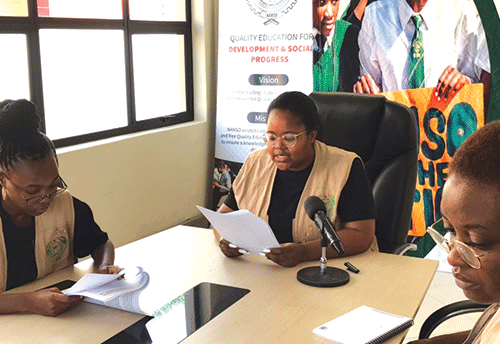THE Namibia National Students’ Organisation (Nanso) has urged the education ministry to increase funds allocated for buying textbooks and other vital teaching materials, emphasising a critical need for intervention in rural areas.
This comes after the announcement of the 2023 Namibia Senior Secondary Certificate Ordinary (NSSCO) and Advanced Subsidiary Levels (NSSCAS) examination results by the ministry last week.
During a press briefing yesterday, Nanso president Lucia Ndishishi expressed the urgent need to increase the funds, stating that this would address the scarcity of teaching and learning resources in rural areas.
Ndishishi said the ministry can contribute to significant improvements in the performance rates at NSSCO and NSSCAS levels by ensuring that all candidates sitting for examinations are adequately prepared.
“The nearly 30 000 NSSCO candidates who will not progress to AS level or institutions of higher education must be retained in the formal education system, at full-time centres, and permitted to re-write examination with the view of improving their results and allowing them an opportunity to continue with their education,” she suggested.
At all material times, Ndishishi said it is expected that policy directives are sensitive to the socio-economic realities of Namibians who are unable to afford the exorbitant fees charged by private colleges and tutorial centres.
She further said this year’s examination results offer some hope, considering that a majority of candidates who wrote last year’s examination must have been in Grade 8 when Covid-19 hit Namibia in 2020.
She said the organisation is however concerned that the performance of the pupils at NSSCO and NSSCAS levels continues to underscore the persistent crisis in basic education.
Ndishishi added that it simply cannot be accepted that a staggering number of candidates who sat the 2023 NSSCO examination failed to progress to the AS level.
Although there was an improvement of 3,8% compared to 2022 results, at least 75% of the pupils who wrote the NSSCO in 2023 did not qualify to proceed with tertiary education or to Grade 12.
“The real context is that 10 000 learners, particularly considering Namibia’s socio-economic inequalities, face the prospect of never making it out of the margins of our economy,” she said.
Ndishishi said the ministry must ensure that all schools meet the prescribed infrastructure and resources standards.
“From appropriately qualified teachers to adequately equipped laboratories and other learning materials, there is a need to ensure that all learners, no matter the geographical location, have access to resources necessary for them to write their examinations with sufficient preparation.”
She encouraged schools to collaborate and share resources where possible, adding that schools are not in competition as it is a national undertaking to ensure that every learner has an equal opportunity to emerge victorious in these incredibly important examinations that determine their future.
“The ministry must commission an investigation and produce a comprehensive report regarding what we believe is a high labour turnover rate among educators. Such report must be presented to various stakeholders to ensure that the issue is accurately informed and resolved,” she said.
Ndishishi further said the organisation is working hand in hand with the ministry of education to find placement for learners who failed their examinations.
- priscillamukokobi@gmail.com


